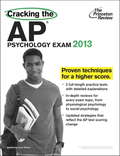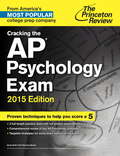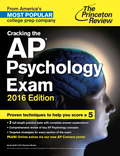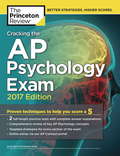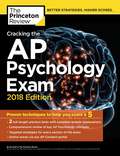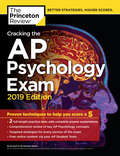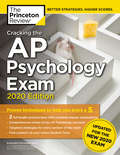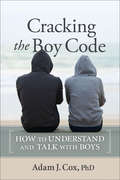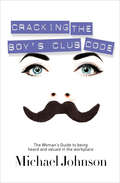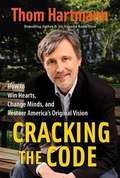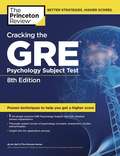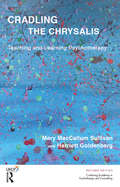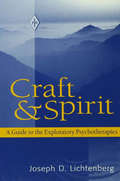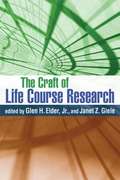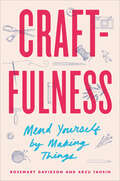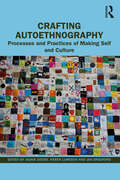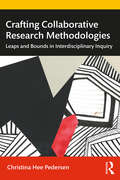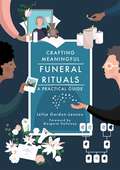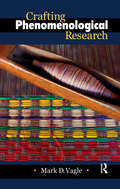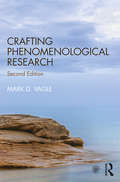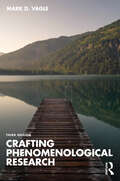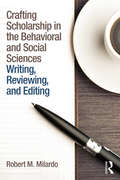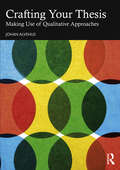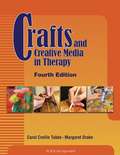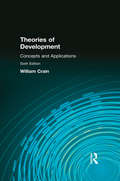- Table View
- List View
Cracking the AP Psychology Exam, 2013 Edition
by Princeton ReviewIf you need to know it, it's in this book! The 2013 edition of Cracking the AP Psychology Exam, 2013 Edition has been optimized for e-reader viewing with cross-linked questions, answers, and explanations. The eBook includes: * 2 full-length practice tests with detailed explanations * Comprehensive coverage of all psychology topics, including biological bases of behavior, cognition, motivation & emotion, developmental psychology, and more * A step-by-step guide to writing high-scoring free response essays * Useful techniques for cracking the multiple-choice section * Updated strategies that reflect the AP test scoring change
Cracking the AP Psychology Exam, 2015 Edition
by Princeton ReviewEVERYTHING YOU NEED TO SCORE A PERFECT 5. Equip yourself to ace the AP Psychology Exam with The Princeton Review's comprehensive study guide--including thorough content reviews, targeted strategies for every question type, and 2 full-length practice tests with complete answer explanations. We don't have to tell you how tough it can be to master AP Psychology--or how vital a stellar exam can be to making your college application competitive at the most selective schools. Written by the experts at The Princeton Review, Cracking the AP Physics C Exam arms you to take on the test with:Techniques That Actually Work.* Tried-and-true strategies to avoid traps and beat the test* Tips for pacing yourself and guessing logically* Essential tactics to help you work smarter, not harderEverything You Need to Know for a High Score.* Comprehensive content reviews for all test topics* Up-to-date information on the 2015 AP Psychology Exam* Engaging activities to help you critically assess your progressPractice Your Way to Perfection.* 2 full-length practice tests with detailed answer explanations* Practice drills at the end of each content review chapter* Detailed step-by-step explanations of sample questions to help you createyour own personal pacing strategy
Cracking the AP Psychology Exam, 2016 Edition
by Princeton ReviewEVERYTHING YOU NEED TO SCORE A PERFECT 5. Equip yourself to ace the AP Psychology Exam with The Princeton Review's comprehensive study guide--including thorough content reviews, targeted strategies for every question type, access to our AP Connect portal online, and 2 full-length practice tests with complete answer explanations. This eBook edition is optimized for on-screen learning with cross-linked questions, answers, and explanations.We don't have to tell you how tough it can be to master AP Psychology--or how vital a stellar exam can be to making your college application competitive at the most selective schools. Written by the experts at The Princeton Review, Cracking the AP Physics C Exam arms you to take on the test with:Techniques That Actually Work.* Tried-and-true strategies to avoid traps and beat the test* Tips for pacing yourself and guessing logically* Essential tactics to help you work smarter, not harderEverything You Need to Know for a High Score.* Comprehensive content reviews for all test topics* Up-to-date information on the 2016 AP Psychology Exam* Engaging activities to help you critically assess your progress* Access to AP Connect, our online portal for helpful pre-college information and exam updatesPractice Your Way to Perfection.* 2 full-length practice tests with detailed answer explanations* Practice drills at the end of each content review chapter* Detailed step-by-step explanations of sample questions to help you createyour own personal pacing strategy
Cracking the AP Psychology Exam, 2017 Edition: Proven Techniques to Help You Score a 5
by Princeton ReviewEVERYTHING YOU NEED TO SCORE A PERFECT 5. Equip yourself to ace the AP Psychology Exam with The Princeton Review's comprehensive study guide--including thorough content reviews, targeted strategies for every question type, access to our AP Connect online portal, and 2 full-length practice tests with complete answer explanations. This eBook edition has been optimized for on-screen viewing with cross-linked questions, answers, and explanations.We don't have to tell you how tough it can be to master AP Psychology--or how vital a stellar exam result can be to making your college application competitive at the most selective schools. Written by the experts at The Princeton Review, Cracking the AP Psychology Exam arms you to take on the test with:Techniques That Actually Work.* Tried-and-true strategies to avoid traps and beat the test* Tips for pacing yourself and guessing logically* Essential tactics to help you work smarter, not harderEverything You Need to Know for a High Score.* Comprehensive content reviews for all test topics* Up-to-date information on the 2017 AP Psychology Exam* Engaging activities to help you critically assess your progress* Access to AP Connect, our online portal for helpful pre-college information and exam updatesPractice Your Way to Perfection.* 2 full-length practice tests with detailed answer explanations* Practice drills at the end of each content review chapter* Detailed step-by-step explanations of sample questions to help you create your personal pacing strategy
Cracking the AP Psychology Exam, 2018 Edition: Proven Techniques to Help You Score a 5 (College Test Preparation)
by Princeton ReviewEVERYTHING YOU NEED TO SCORE A PERFECT 5. Equip yourself to ace the AP Psychology Exam with this comprehensive study guide—including thorough content reviews, targeted strategies for every question type, access to our AP Connect online portal, and 2 full-length practice tests with complete answer explanations. This eBook edition has been optimized for on-screen learning with cross-linked questions, answers, and explanations. Written by the experts at The Princeton Review, Cracking the AP Psychology Exam arms you to take on the test with:Techniques That Actually Work.• Tried-and-true strategies to avoid traps and beat the test• Tips for pacing yourself and guessing logically• Essential tactics to help you work smarter, not harderEverything You Need to Know for a High Score.• Comprehensive content reviews for all test topics• Up-to-date information on the 2018 AP Psychology Exam• Engaging activities to help you critically assess your progress• Access to AP Connect, our online portal for helpful pre-college information and exam updatesPractice Your Way to Perfection.• 2 full-length practice tests with detailed answer explanations• Practice drills at the end of each content review chapter• Detailed step-by-step explanations of sample questions to help you create your personal pacing strategy
Cracking the AP Psychology Exam, 2019 Edition: Practice Tests & Proven Techniques to Help You Score a 5 (College Test Preparation)
by Princeton ReviewEVERYTHING YOU NEED TO SCORE A PERFECT 5. Ace the AP Psychology Exam with this comprehensive study guide—including 2 full-length practice tests with complete answer explanations, thorough content reviews, targeted exam strategies, and access to online extras. Everything You Need to Know for a High Score.• Comprehensive content reviews for all test topics• Up-to-date information on the 2019 AP Psychology Exam• Engaging activities to help you critically assess your progress• Access to online study plans, a handy list of key terms, helpful pre-college information, and morePractice Your Way to Perfection.• 2 full-length practice tests with detailed answer explanations• Practice drills at the end of each content review chapter• Detailed step-by-step explanations of sample questions to help you create your personal pacing strategyTechniques That Actually Work.• Tried-and-true strategies to avoid traps and beat the test• Tips for pacing yourself and guessing logically• Essential tactics to help you work smarter, not harderWritten by the experts at The Princeton Review, Cracking the AP Psychology Exam arms you to take on the test and achieve your highest possible score.
Cracking the AP Psychology Exam, 2020 Edition: Practice Tests & Prep for the NEW 2020 Exam (College Test Preparation)
by The Princeton ReviewEVERYTHING YOU NEED TO SCORE A PERFECT 5. Ace the 2020 AP Psychology Exam with this comprehensive study guide—including 2 full-length practice tests with complete answer explanations, thorough content reviews, targeted exam strategies, and access to online extras. Techniques That Actually Work.• Tried-and-true strategies to help you avoid traps and beat the test• Tips for pacing yourself and guessing logically• Essential tactics to help you work smarter, not harderEverything You Need to Know to Help Achieve a High Score.• Comprehensive content review for all test topics• Up-to-date information on the 2020 AP® Psychology Exam• Useful lists of key terms in every content review chapter• Access to study plans, a handy list of key terms, helpful pre-college information, and more via your online Student ToolsPractice Your Way to Excellence.• 2 full-length practice tests with complete answer explanations• Practice drills at the end of each content review chapter• Detailed step-by-step explanations of sample questions to help you create your personal pacing strategy• Online study guides to strategically plan out your AP Psychology prepWritten by Princeton Review experts who know their way around bio, Cracking the AP Psychology Exam gives you the tools you need for the score you want.
Cracking the Boy Code: How to Understand and Talk with Boys
by Adam J. CoxA clinical psychologist specializing in children and adolescents shares the secret language of boys and how to reconnect with them.All too quickly, talkative, affectionate young boys seem to slip away. Adolescents may be transformed overnight into reclusive, seemingly impenetrable young people who open up only to their friends and spend more time on devices than with family. How do you penetrate this shell before they are lost to you?Drawing on decades of experience garnered through thousands of hours of therapy with boys, Cracking the Boy Code explains how the key to communicating with boys is understanding their universal psychological needs and using specific, straightforward communication techniques. Coverage includes:Why it’s important to understand the psychological needs of boysHow to talk to be heard, and listen to understandThe crucial role of non-verbal cuesLearning the universal tone that helps boys listenMotivating boys to become their authentic selvesUsing purposeful work to teach boys self-respect and confidenceReducing stress and creating greater closeness between boys and caregiversCracking the Boy Code is essential reading for parents, caregivers, teachers, youth workers, coaches, and others who want to make a real connection with the boys in their lives.Praise for Cracking the Boy Code“Cox unpacks in simple language the intricacies of communicating with boys . . . . The book is an educational revelation resulting from remarkable face to face research, and provides an exceptional tool to help parents and teachers understand what makes boys tick.” —David Anderson B.A, Dip TG, B.Ed, Cert. of Care, Sydney Australia IBSC Jarvis/Hawley Award Baltimore USA 2017“A thoughtful, accessible guide to developing meaningful communication with the boys in our lives. Adam Cox’s insights, grounded in practical wisdom cultivated over decades of clinical work with boys, provide readers with compelling possibilities for using non-verbal cues, tone of voice, hands-on activity, and empathetic listening to connect with boys in a manner both deep and enduring . . . . Dr. Cox’s latest work is both inspiring and instructive.” —Dr. John M. Botti, Head of School, The Browning School
Cracking the Boy's Club Code: The Woman's Guide to Being Heard and Valued in the Workplace
by Michael Johnson&“Frustrated working with male co-workers? Wish you had a key to understanding the male business mind? Look no further&” (Claire Shipman, Senior National Correspondent for Good Morning America). Wouldn&’t it be nice to have a decoder ring to understand how men think? Cracking the Boy&’s Club Code gives you creative strategies for winning respect from male co-workers and getting the outcomes you want. In a unique, engaging style respectful of both sexes, Michael Johnson outlines gender communication styles and how to work within them to enable more harmonious interoffice interactions. Learn communication strategies that help you get heard, appreciated and rewarded. Discover hidden rules that govern men&’s behavior at work. Learn the top ten ways women sabotage themselves. Find out how to offer ideas with authority—and get credit for them. Identify your unconscious habits that undermine credibility. With practical suggestions geared toward the business world, Johnson shows us how men&’s conversational rituals and verbal power games can cause your best efforts to go unnoticed and unappreciated in the workplace. A must read for women who work with men, this book offers a peek into to the male business mind. Once you&’ve cracked the boy&’s club code, you&’ll be heard, valued, and appreciated—without compromising your authenticity. &“There&’s no need to break the glass ceiling . . . just remove it! Johnson gives women a unique peek into the unspoken rules men use in business, then shows us how to use those same rules to our advantage. This book is destined to be a classic for all women in business. Read it and ROCK!&” —Christine Comaford, CEO, Mighty Ventures and author of Rules for Renegades
Cracking the Code: How to Win Hearts, Change Minds, and Restore America's Original Vision
by Thom HartmannAs you read deeply in this book, you'll see things you hadn't realized were there--in everything from advertising to political rants. You'll learn the three ways people absorb information and how to appeal to each to get your message across, the kinds of words to use when trying to sway people and the kinds to avoid, why politics is all about stories and how knowing what those stories are will help you understand and connect with your audience, and much more.
Cracking the GRE Psychology Subject Test (8th Edition)
by Meg JayThis book is designed to be a comprehensive text to help you getting into graduate school in psychology and has four sections --The test,The material,The practise test and The admission process.
Cradling the Chrysalis: Teaching and Learning Psychotherapy (The\united Kingdom Council For Psychotherapy Ser.)
by Harriett GoldenbergThis book addresses the ethical and philosophical basis for the teaching/learning involved in becoming a psychotherapist. How can training prepare prospective psychotherapists, counsellors, and counselling psychologists for a task whose practitioners cannot even agree as to whether it is an art or a science, an impersonal clinical interaction or a profoundly humane, even 'spiritual' encounter? The authors believe they share with their students a passion about the possibilities inherent in this particular kind of conversation. Such a meeting demands a fully personal engagement and a profoundly ethical attitude towards the relationship with the Other; it is also potentially an important beginning in 'repairing the world'. The book explores the relative importance and emphasis of the structure, content and process of psychotherapy training. Its thesis is that the teaching/learning takes place in the quality of the reciprocal meeting between the teacher and the learner.
Craft and Spirit: A Guide to the Exploratory Psychotherapies (Psychoanalytic Inquiry Book Series #20)
by Joseph D. LichtenbergIn Craft and Spirit, Joseph Lichtenberg writes of the craft of exploratory psychotherapy, by which he means the creative skill — even artistry — that mobilizes the spirit of inquiry in therapist and patient and sustains it over the course of psychotherapy. He expatiates on this craft as it pertains to patients of our time — patients who typically bring to therapy backgrounds of insecure attachment and serious concerns about safety and retraumatization. In each of ten chapters, Lichtenberg formulates a different guideline for technique, keyed to the broad domain of exploratory psychotherapies and are accompanied by numerous clinical illustrations. These guidelines seek to foster greater therapist involvement without compromising an openness to psychological exploration. They seek to sensitize therapists to the two interlacing tracks of communication that unfold in treatment: those of verbal exchange and of enactive messages. And they help guide therapist attention among interpenetrating domains of the patient’s subjectivity, the therapist’s subjectivity, and the intersubjective realm that emerges from their collaborative experience. Fusing the humanist tradition of therapeutic inquiry with knowledge gained from recent infancy and child research, Lichtenberg develops guidelines suitable to exploratory therapy with patients who communicate not only verbally but also through diverse affect states and altered cognitions. Consistently illuminating on the parallels and disjunctions between caregiver–child and therapist–patient relationships, Lichtenberg is clear about the adult-to-adult dimension of exploratory work in which “provision” is necessarily subordinate to “inquiry.” Craft and Spirit is aimed equally at prospective patients, therapists, and analysts, all of whom will be edified by this masterful demonstration of the ways in which a spirit of inquiry imbues the craft of psychotherapy, in Lichtenberg’s words, “with its liveliness of sustained purpose.”
Craft of Life Course Research
by Janet Giele Glen Elder Jr.This book brings together prominent investigators to provide a comprehensive guide to doing life course research, including an 'inside view' of how they designed and carried out influential longitudinal studies. Using vivid examples, the contributors trace the connections between early and later experience and reveal how researchers and graduate students can discover these links in their own research. Well-organized chapters describe the best and newest ways to Use surveys, life records, ethnography, and data archives to collect different types of data over years or even decades. Apply innovative statistical methods to measure dynamic processes that result in improvement, decline, or reversibility in economic fortune, stress, health, and criminality. Explore the micro- and macro-level explanatory factors that shape individual trajectories, including genetic and environmental interactions, personal life history, interpersonal ties, and sociocultural institutions.
Craftfulness: Mend Yourself by Making Things
by Rosemary DavidsonIntegrating mindfulness, neuroscience, positive psychology, and creativity research, Craftfulness offers a thought-provoking and surprising reconsideration of craft, and how making things with our hands can connect us to our deepest selves and improve our well-being and overall happiness.We should get this out of the way: Craftfulness is not a crafting book. Rather, it is an investigation of the wisdom generations of men and women know to be true: making things is a vital means of self-expression, self-realization, and self-help that sparks the mind, touches the soul, and rejuvenates the spirit.Process, not product, is the soul of craft practice. Whether you knit, crochet, sculpt, weave, quilt, tat, draw, or bind books, working toward small, attainable goals gives us a sense of purpose, accomplishment, and control that is proven to positively impact our mental health and happiness.In Craftfulness, Rosemary Davidson and Arzu Tahsin offer a brilliantly reasoned argument in favor of craft and its positive impact on our mental well-being. Weaving personal experiences with the latest science on mindfulness, happiness, and creativity, they illuminate how craft practice reintroduces balance into our lives and habits by cultivating creativity, promoting focus, creating a safe environment for failure, and encouraging us to make peace with imperfection.Like Matthew B. Crawford’s Shop Class as Soulcraft, Ken Robinson’s Out of Our Minds, and Mihaly Csikszentmihalyi’s Flow, Craftfulness helps us to see our world in a new way, offering opportunities to disconnect and pay attention to ourselves.
Crafting Autoethnography: Processes and Practices of Making Self and Culture
by Jan Bradford Karen Lumsden Jackie GoodeThis collection explores how autoethnography is made. Contributors from sociology, education, counselling, the visual arts, textiles, drama, music, and museum curation uncover and reflect on the processes and practices they engage in as they craft their autoethnographic artefacts. Each chapter explores a different material or media, together creating a rich and stimulating set of demonstrations, with the focus firmly on the practical accomplishment of texts/artefacts. Theoretically, this book seeks to rectify the hierarchical separation of art and craft and of intellectual and practical cultural production, by collapsing distinctions between knowing and making. In relation to connections between personal experience and wider social and cultural phenomena, contributors address a variety of topics such as social class, family relationships and intergenerational transmission, loss, longing and grief, the neoliberal university, gender, sexuality, colonialism, race/ism, national identity, digital identities, indigenous ways of knowing/making and how these are ‘storied’, curated and presented to the public, and our relationship with the natural world. Contributors also offer insights into how the ‘crafting space’ is itself one of intellectual inquiry, debate, and reflection. This is a core text for readers from both traditional and practice-based disciplines undertaking qualitative research methods/autoethnographic inquiry courses, as well as community-based practitioners and students. Readers interested in creative practice, practitioner-research and arts-based research in the social sciences and humanities will also benefit from this book.
Crafting Collaborative Research Methodologies: Leaps and Bounds in Interdisciplinary Inquiry
by Christina Hee PedersenCrafting Collaborative Research Methodologies demonstrates a number of collaborative, visual and narrative methods that explore the promises and the ethical, relational complexities inherent in collaborative research. It engages with both the potentials and complexities of doing collaborative analysis and offers a medley of methods for analysis. These methods revolve around co-produced texts from Peru, Denmark and Bolivia, and involve images, memory work and practical approaches to intersectionality thinking. Through detailed explorations of the complex interweaving of issues of meaning-making, difference and the co-production of knowledges, dynamics of social exclusion and segregation become visible in the nexus between evocation and interpretation. Christina Hee Pedersen takes up the poststructuralist challenge of including researcher subjectivity as part of the analysis and, through a lively writing style, the reader is invited to engage in this analysis of the performativity of selves. This book can inspire analytical thinking for researchers and advanced students interested in expanding the rich dialogues among feminists doing poststructuralist and interdisciplinary inquiry, and for all students of qualitative and collaborative methodologies.
Crafting Meaningful Funeral Rituals: A Practical Guide
by Jeltje Gordon-LennoxFunerals are among the most important life events in Western society, and fashioning a personalized ceremony for yourself or for a loved one is often the most meaningful way to celebrate the life of the deceased. For those wanting non-religious or secular funeral ceremonies, this step-by-step guide begins by identifying what you want from the funeral and showing how you can make it happen. With sections on society's views of mortality, our need for rituals and crafting the actual ceremony, this guide provides the tools and philosophy to understand, plan and tailor a funeral for individuals. Includes all the tools necessary for the creation of a ceremony, such as a Ritual Profiles, checklists, and many other handy resources.
Crafting Phenomenological Research
by Mark D. VagleThis is an accessible, concise introduction to phenomenological research in education and social sciences. Mark Vagle outlines the key principles for conducting this research from leading contemporary practitioners, such as van Manen, Giorgi, and Dahlberg. He builds on their work by introducing his post-intentional phenomenology, which incorporates elements of post-structural thinking into traditional methods. Vagle provides readers with methodological tools to build their own phenomenological study, addressing such issues as data gathering, validity, and writing. Replete with exercises for students, case studies, resources for further research, and examples of completed phenomenological studies, this brief book affords the instructor an easy entrée into introducing phenomenology into courses on qualitative research, social theory, or educational research.
Crafting Phenomenological Research
by Mark D. VagleBuilding off the success of its award-winning first edition, the second edition of Crafting Phenomenological Research continues to be the leading resource for those interested in a concise introduction to phenomenological research in education and social sciences. Joining leading contemporary practitioners, such as van Manen, Giorgi, and Dahlberg, Vagle walks the reader through multiple approaches to designing and implementing phenomenological research, including his post-intentional phenomenology, which incorporates elements of post-structural thinking into traditional methods. Vagle provides readers with methodological tools to build their own phenomenological study, addressing such issues as research design, data gathering and analysis, and writing. Replete with exercises for students, resources for further research, and examples of completed phenomenological studies, this book affords the instructor an easy entrée into introducing phenomenology into courses on qualitative research, social theory, or educational research. New to this edition: An additional first chapter that outlines the historical background of phenomenological philosophy and methodology. A feature called "snapshots" that provides brief commentary and/or examples to illustrate concepts and ideas. Updated "resource digs" providing more examples, with the addition of more international resources.
Crafting Phenomenological Research
by Mark D. VagleCrafting Phenomenological Research, Third Edition, continues to demonstrate its award-winning quality, clearly establishing itself as the leading international resource for those interested in a concise introduction to phenomenological research in education and social sciences.As a leading contemporary practitioner of phenomenology, Vagle walks the reader through multiple approaches to designing and implementing phenomenological research, including his post-intentional phenomenology, which incorporates elements of poststructural thinking into longstanding phenomenological methods. Vagle provides readers with methodological tools to build their own phenomenological study, addressing such issues as research design, data gathering and analysis, and writing.Replete with exercises for students, resources for further research, and examples of completed phenomenological studies, this book affords the instructor an easy entrée into introducing phenomenology into courses on qualitative research, social theory, or educational research.New to this edition: A new final chapter that introduces his latest developments in post-intentional phenomenology (PIP). Updated "snapshots" and “resource digs” that provides brief commentary and/or examples to illustrate concepts and ideas, many of which draw on Vagle’s latest contemplative research study. Updated discussions of important methodological concepts such as researcher reflexivity.
Crafting Scholarship in the Behavioral and Social Sciences: Writing, Reviewing, and Editing
by Robert M. MilardoCrafting Scholarship helps readers improve their writing and publishing success in academia. Framed within the context of the editorial and peer review process, the book explores writing, editing, and reviewing in academic publishing. As such it provides unique coverage of how successful writers work, how they manage criticism, and more. Examples from successful scholars provide helpful tips in writing articles, grants, books, book chapters, and reviews. Each chapter features tools that facilitate learning including Best Practices and Writer’s Resource boxes to help maximize success, discussion questions and case studies to stimulate critical thinking, and recommended readings to encourage self exploration. A Facebook page provides an opportunity for readers to post writing updates and for instructors to share materials. Highlights include: -Insights on working with journal boards, reviewers, and contributors drawn from the author’s 30 years of experience in editing journal articles and writing books. -Describes writing quantitative and qualitative reports, theory and literature reviews, books and chapters, grants, and book reviews. -Identifies common problems academics face in writing and publishing along with practical solutions. -Explores best practices in writing peer reviews, responding to reviewers and editors, and how to calculate and interpret acceptance rates and impact factors. -Addresses how to write each section of a journal article and select keywords that facilitate digital search engines to help potential readers find an article. -Includes examples of published work and tips on writing research syntheses using meta-analytic techniques or narrative analyses. -Examines the practices of successful writers, the pros and cons of collaborations, what publishers look for, and managing criticism. -Reviews pertinent empirical literature on the core topics of writing, reviewing, and editing. Intended for graduate or advanced undergraduate courses in professional development, writing in an academic field, or research methods taught in psychology, education, human development and family studies, sociology, communication, and other social sciences, this practical guide also appeals to those interested in pursuing an academic career and new and seasoned researchers.
Crafting Your Thesis: Making Use of Qualitative Approaches
by Johan AlvehusAt the beginning of writing a thesis, many questions arise, for example:• How do I know that I have formulated a relevant research problem?• Have I chosen the right empirical method?• Are interviews or observations appropriate?• How should I structure my text to get my point across in the best way?• What exactly is a theory?• How can the quality of my work be assessed?Crafting Your Thesis is a broad and accessible handbook in qualitative methods that gives you clear and concise answers to these questions – and many more. The book can be used both in introductory university courses, where you as a student encounter questions of method for perhaps the first time, and right up to Master’s thesis level, where it gives a quick overview of different available qualitative methods and highlights questions that must be dealt with when crafting the thesis.
Crafts And Creative Media In Therapy
by Carol Crellin Tubbs Margaret DrakeEngagement in crafts and other creative activities is making a comeback as an established method in the occupational therapy rehabilitation process. With the profession promoting a return to purposeful activity and “occupation” as key components of treatment, the Fourth Edition of Crafts and Creative Media in Therapy will continue to be a leading resource.
Crain, Theories of DevelopmentConcepts and Applications (Subscription): Concepts and Applications
by William CrainThe result of extensive scholarship and consultation with leading scholars, this classic text introduces students to twenty-four theorists and compares and contrasts their theories on how we develop as individuals. Emphasizing the theories that build upon the developmental tradition established by Rousseau, this text also covers theories in the environmental/learning tradition. New to this Edition: Research and citations have been updated throughout. Expansion of the chapter on ethology, reflecting the author's growing conviction that the study of animal behavior casts considerable light on human development. Several chapters give greater attention to children's play. In addition, the chapter on Vygotsky adds a description of the popular, play-oriented Tools of the Mind education program, and the chapter on ethology concludes with a discussion of the question, "Is the young child's urge to play innate?" Knowing that students want to discuss moral and philosophical issues as fully as possible, the 6th edition includes Kohlberg's speculations about the possibility of a seventh stage of spiritual development.
